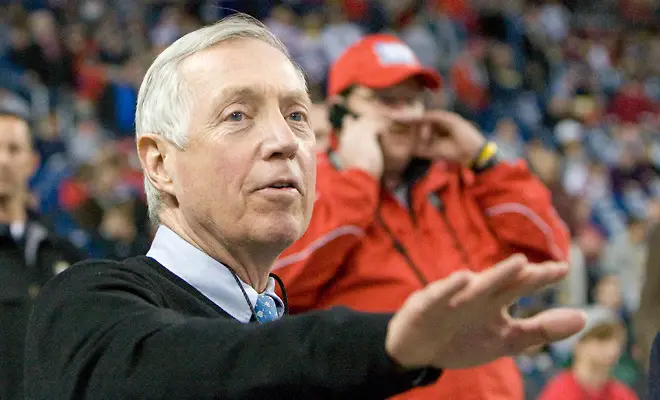
Jerry York, the winningest coach in NCAA hockey history, five-time NCAA champion, National Hockey League and U.S. Hockey hall of famer, and beloved Boston College ambassador and university citizen, has announced his retirement after 50 years of Division I coaching, including 28 years as coach of the Eagles.
The 76-year-old York met with his coaches and players today to inform them of his decision which, he said, was based on a desire to travel more with his wife, Bobbie, play golf for the first time during a weekend in the fall, spend more time with his family, and watch his two grandchildren play hockey, lacrosse, and soccer games in Pittsburgh.
“I have been thinking about the possibility of retiring during the past several weeks and it just seemed to me to be the right time to do so,” said York in a statement. “I am so blessed to have been involved with Boston College these past 28 years and to have had the opportunity to coach so many wonderful student-athletes.”
Boston College director of athletics Patrick Kraft praised York for his unparalleled contributions to Boston College and the sport of hockey.
“It is difficult to put into words all that Jerry York means to Boston College,” said Kraft. “His record as the winningest coach in NCAA men’s ice hockey and BC hockey speak for themselves, but it is his humility, decency, unwavering commitment to his players, fellow coaches, and all of us in the BC family, and the quiet ways in which he contributes to this community that make him so beloved. He is a legend and one of the classiest individuals to ever coach in college sports. It has been a joy to work with him, and on behalf of all of us in the BC community I wish him, Bobbie, and his entire family the very best in his retirement years.”
York was hired at Boston College in 1994 after coaching for 15 years at Bowling Green (1979-94) where he won the national championship in 1984. He began his head coaching career at Clarkson University at the age of 27, leading the Golden Knights from 1972 to 1979.
One of only three coaches in NCAA history to win an NCAA championship at two different schools, York led BC to the national title in 2001, 2008, 2010, and 2012. On Dec. 29, 2012, he became the all-time winningest coach in college hockey, passing Michigan State’s Ron Mason.
He finishes his career with 1,123 wins—including a record-setting 41 NCAA tournament victories. York coached the Eagles to nine Hockey East Tournament titles and 12 regular-season championships, including at least a share of five of the last seven league titles. He was named Hockey East Coach of the Year in 2004, 2011, 2014, 2018, and most recently in 2021, and won the Spencer Penrose trophy as NCAA Division I coach of the year in 1977.
Known as a caring mentor who was ever willing to support his players during and after their time at BC, York coached four Hobey Baker Award winners (given to college hockey’s best player), 17 NHL first-round draft picks, 12 Stanley Cup champions, and scores of players who went on to successful careers in the NHL. He also coached multiple Olympians and mentored dozens of individuals who went on to serve as NHL coaches, general managers, and presidents of hockey operations.
His reputation for treating all of his players equally and holding them to the highest standard on and off the ice solidified his standing throughout the sporting world and endeared him to generations of hockey players and their families, whether in Potsdam, N.Y., Bowling Green, Ohio, or in Chestnut Hill, Mass.
A star player at Boston College High School before coming to the Heights to play for coach John “Snooks” Kelley, York was named first team All-America in 1967 and won the Walter Brown Award for the top American-born player in New England that same year. He scored 134 points as a player (84 goals, 70 assists) and led the Eagles to a 60-29 record, the 1965 Beanpot title, and a second-place finish in the 1965 NCAA Tournament.
“The highlight of my career was on June 15, 1994, when BC president J. Donald Monan, S.J., and athletic director Chet Gladchuk invited me to meet with them at BC,” said York. “We toured the campus, and later that evening Fr. Monan invited me to his office in Botolph House to talk. ‘I want you to be the next hockey coach at BC,’ he said. ‘I know you will make us proud.’ It has been an honor to serve my alma mater, to work for Fr. Monan and Fr. Leahy, and to coach with so many terrific assistants and fellow BC coaches. I leave knowing that it is the right time to go.
“The book hasn’t closed, but it is time for me to start a new chapter.”


